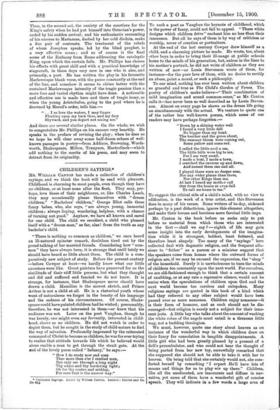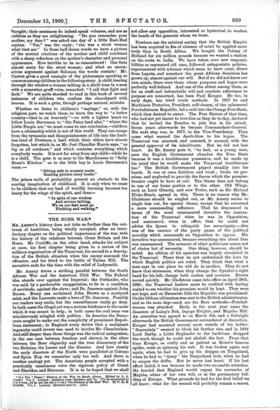CHILDREN'S SAYINGS.* MR. Wflaaara CANTON has made a collection of
children's sayings, and we think the book will be read with pleasure. Childhood is charming to most people, even though they have no children, or at least none after the flesh. They may, per- haps, love those of their neighbours, or, like Charles Lamb, they may occasionally please themselves with " dream children." " Bachelors' children," George Eliot calls these fancy babes, who, she says, " are always young, immortal children ; always lisping, wandering, helpless, with a chance of turning out good." Anyhow, we have all known and cared for one child. The child we recollect, a child who pleased itself with a " dream man," as far, alas ! from the truth as any bachelor's child.
" There is nothing so common as children," we once heard an ill-natured spinster remark, doubtless tired out by the proud talking of her married friends. Considering how " com- mon" they have always been, it is strange that until lately we should have heard so little about them. The child is a com- paratively new subject of study. Before the present century —before Cowper at least—we hardly know what our little ancestors were like. Great painters have preserved for us the similitude of their stiff little persons, but what they thought and did and suffered and fancied we do not know. It is strange, for instance, that Shakespeare never should have drawn a child. Mamilius is the merest sketch, and Prince Arthur is not a child at all. He is a rhetorical youth whose want of naturalness we forget in the beauty of his language and the sadness of his circumstances. Of course, Shake- speare could have painted children had he wished; presumably, therefore, he was not interested in them—or knew that his audience was not. Later on the poet Vaughan, though he was keenly, one might even say fervently, interested in child- hood, shows us no children. He did not watch in order to depict them, but he sought in the study of child-nature to find the way of salvation. Profoundly impressed by the reiterated command of Christ to become as children, he was for ever trying to realise that attitude towards life which he believed would alone enable a man to get through the strait gate. At the and of the lovely poem called " Infancy," he says :—
" How I do study now and scan Thee more than e'er I studied man, But only see through a long night Thy edges and thy bordering light ; Oh for thy centre and midday, For sure that is the narrow way."
• D Chi/dm/is Sayings. Ldited by Will Canton. London : Isblster and Co. s. 6c1.1
To such a poet as Vaughan the keynote of childhood, which is the power of fancy, could not fail to appeal. " Those white designs which children drive" enchant him no less than their innocence. But all he says of them is by way of criticism or worship, never of creation or portraiture.
At the end of the last century Cowper drew himself as a child, and a charming picture he made. He wrote, too, about other boys in order to bring their ill-usage at public schools home to the minds of his generation, but, unless in the lines to his mother's portrait, he did not write of children as they are written of now—as Louis Stevenson wrote of them, for instance—for the pure love of them, with no desire to rectify an abuse, point a moral, or seek a philosophy.
To our mind, nothing has ever been written about children as graceful and true as The Child's Garden of Verses. The poetry of children's make-believe—" Their combination of mild imagination and sound common-sense," as Mr. Canton calls it—has never been so well described as by Louis Steven- son. Almost on every page he shows as the dream life going on simultaneously with the actuaL We venture to quote one of the rather less well-known poems, which some of our readers may have perhaps forgotten:—
" Down by a shining water well I found a very little dell
No bigger than my head. The heather and the gorse about, The summer bloom were coming out, Some yellow and some red.
I called the little pool a sea, The little hills were big to me, For I am very small.
I made a boat, I made a town,
I searched the caverns up and down, And named them one and all.
I played there were no deeper seas, Nor any wider plains than these, Nor other Kings than me. At last I heard my mother call Out from the house at even-fall To call me home to tea."
To suggest the ethical side of a child's mind, with no view to edification, is the work of a true artist, and this Stevenson does in many of his verses. Some writers of to-day, sickened perhaps by a past didacticism, ignore this element altogether, and make their heroes and heroines mere farcical little imps.
Mr. Canton in the book before us seeks only to put before us material from which those who are interested in the first — shall we say — eighth of life may gain some insight into the early developments of the imagina- tion while it is strongest, boldest, least fettered, and therefore least shapely. Too many of the " sayings " here collected deal with dogmatic religion, and the frequent allu- sions to " father " as a parson or a minister suggest that the speakers come from homes where the outward forms of religion are, if we may be excused the expression, the " shop " of the household. Surely it is unwholesome to turn the minds of children too constantly upon the nest world. For ourselves, we are old-fashioned enough to think that a certain amount of snubbing, or at any rate a repressive silence, would not be amiss when the speculations of children upon God and the next world become too careless and outspoken. Many religious sayings are quoted in this book of a kind which had they referred to any other subject would have been passed over as mere nonsense. Children enjoy nonsense—it is their form of humour, and as such should not be dis- couraged—but religion is surely not a subject for their inno- cent jests. A little boy who talks about the amount of washing the white robes of the angels must entail is a tiresome little wag, not a budding theologian.
We must, however, quote one story, about heaven as an instance of the wonderful way in which children draw on their fancy for consolation in tangible disappointments. A little girl who had been greatly pleased by a present of a doll's perambulator, and who could not bear the thought of being parted from her new toy, sorrowfully remarked that she supposed she should not be able to take it with her to heaven. On being told that she certainly would not, she com- forted herself by remarking "I expect He'll have lots of moons and things for us to play wiv up there." Children, like all the uneducated, are inaccurate and diffuse in nar- rative, yet some of them have a wonderful gift of concise speech. They will indicate in a few words a large area of
thought; their sentences do indeed speak volumes, and are as ruthless as they are enlightening. " Do you remember your mother, my dear ? " was asked one day of a little East-End orphan. " Yee," was the reply ; " she was a stout woman what beat me." In these half-dozen words we have a picture of the mutual relations of the mother and child combined with a sharp reflection on the mother's character and personal appearance. How terrible to be so remembered ! One feels almost sorry for the stout woman ; and what an uncon- scious argument against Solomon the words contain ! Mr, Canton gives a good example of the picturesque speaking so common among children in the following story. A child, hearing through the window a woman talking in a shrill tone to a man with a somewhat gruff voice, remarked : " I call that light and dark." We are quite shocked to read in this book of several instances of children who confuse the churchyard with heaven. It is such a grim, though perhaps natural, mistake.
Whether we listen to children's " sayings," or, with the religious poet, we watch them, to learn the way to " a better country—that is, an heavenly "—or with a lighter heart we follow Louis Stevenson to " the Fairy-land afar," " where the Little People are," we must come to one conclusion,—children have a citizenship which is not of this world. They can escape from the tyrannies and disappointments of life into the limit- less land of Pretence, a land which their elders have almost forgotten, but which is, as Mr. Joel Chandler Harris says, " as big as all outdoors," and which contains everything which everybody wants. It is not far away from any child—while he is a child. The gate is as near to the Marchioness in " Sally Brass's Kitchen " as to the little boy in Louie Stevenson's verse :— " Sitting safe in nursery nooks Reading picture story books."
The prison walls of probability present no obstacle to the soaring imagination of childhood. It is only when we cease to be children that our load of worldly learning becomes too heavy for the wings of the spirit, and then- " In spite of our wisdom And serious talking, We on our feet must go Plodding and walking.'















































 Previous page
Previous page